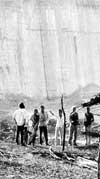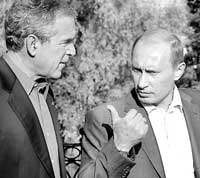|
Damn the oustees: India’s ugly face of development
When I was coming out of the court of the Chief Justice of India, one top lawyer appearing for Gujarat remarked: "You lost the case because you simply went after big dams while your emphasis should have been on the relief and rehabilitation of the ousted." But this is not true. The debate over big or small dams may be going on all over the world, but not in India. Those opposing the Sardar Sarovar dam on the Narmada have been concentrating on the rehabilitation of the uprooted whose number rose in proportion to the dam's height. The objection is not because of any ideological reasons but for the simple fact that the height and rehabilitation have been separated. Now there is no land for land, as the 16-year-old Narmada Tribunal Award says. Nor is there any compliance of the statutory obligation to prepare the rehabilitation site one year before the ousting is planned. It is a pity that the Supreme Court did not enforce the tribunal award and instead accepted that cash could be given in place of land. The Court has given a shoddy judgment based on a shoddy report, endorsed by a shoddy government. The Manmohan Singh government seems to have got scared because of the BJP which controls the state of Gujarat, the main beneficiary of the dam. It is rather unfortunate that the Prime Minister's letter to the Supreme Court endorsed the report by the Shunglu Committee which was appointed to assess the rehabilitation work in Madhya Pradesh. The report says: that the striking fact is that the land bank of Madhya Pradesh "has land which is neither irrigable nor cultivable." How can the Prime Minister say that the committee's report — it is manned by pro-establishment experts — "seems to have given a fairly accurate picture of the facts and circumstances as obtained on the ground?" Only a few weeks ago he had sent a three-member ministerial group, headed by Water Resources Minister Saifuddin Soz, which said that no infrastructural work had been done and amenities like sanitation, drinking water and others were not provided at the rehabilitation sites. Even if the MP government had put in day and night work, it could not have created facilities that were absent when the ministerial group visited. The group also roundly criticised the Narmada Control Authority that gave permission to raise the height of the dam on the basis of information which "has largely been based on paper work and it has no relevance to the situation on the ground." Suddenly, the Prime Minister now considers the Shunglu Committee report as gospel truth. It is not difficult to know why he has said so. The record of the Supreme Court is also not praiseworthy. It said at the last hearing that "submergence would not be allowed to take place until complete settlement and rehabilitation of oustees is done." But it accepted the findings of the Shunglu Committee. When the tribunal has laid down "land for land" how could the Supreme Court accept the Shunglu Committee's conclusion that "a large number of families have taken cash willingly, not because they opted for purchasing of own choice…" The Supreme Court should have pointed out that the government had to offer the oustees land for the land they had lost. True, Medha Padkar and her supporters in the Narmada Bachao Andolan were dead against the building of the dam at one time. They even approached the World Bank and Japan to stop the loan for the dam. Both did so. But this did not make either the centre or Ahmedabad consider other options, of making small dams or getting irrigation facilities from the run of water. It required a huge investment. I recall that in 1990 when I was India's High Commissioner in London, the then Gujarat chief minister Chimanbhai Patel toured the UK to appeal to the Gujaratis to lend money for building the dam. Public bonds were also issued for this purpose. A large amount was collected because the Narmada dam had by this time become an emotional issue for the Gujaratis. They would even say that this was their Kashmir. However, a settlement of sorts was reached when an undertaking was given that before raising the height of the dam it would be ensured that the uprooted had proper sites to go to with necessary infrastructure, including schools. The government did not live up to the assurance. What blew up the entire understanding was when the Narmadha Control Authority gave permission to raise the height by nearly 13 metres, from 110 metres to 122.9 metres, without consulting the Narmadha Bachao Andholan (NBA) or any other group. Medha Padkar went on an indefinite hunger strike.
That was when the Prime Minister sent a three-member ministerial
committee to Madhya Pradesh. In all fairness, the raising of the dam's height should have been stopped because that was the raison d'tre of the complaint. Now because of the monsoon the work has come to a stall automatically. But where is the justice when the dam has already been raised by eight metres — up to 119 metres? It is only three metres short of the targeted height. Both the Supreme Court and the Prime Minister have preferred convenience. The matter stays at that. However, this makes a mockery of the numerous undertakings that the Narmada dam oustees would be given land for land and even a house for living. Although the award that people would be rehabilitated first and the height of the dam would be raised later was not followed either in letter or spirit, people expected relief and rehabilitation even of some lower standard. This raises the larger question: how far the government's claim that development would be with human face is worth trusting? The treatment meted out to the ousted, primarily adivasis and tribals who are least able to defend their rights, reveals an ugly face of development. (This article was specially contributed to The Sunday Times International section) G-8 summit: Putin reviving
Russia’s Cold War prestige
St Petersburg where Russian President Vladimir Putin is hosting the G8 summit right now is the city that Peter the Great had built. In the 17th century Peter 1, known as Peter the
Great, made Russia the dominant power in Europe superseding Sweden
that had held sway. The summit that he chairs today and will continue to head the G8 until the next meeting of leaders of the industrialised world, has given him the opportunity to be an equal partner and not a mere peripheral participant as in the days of the G7 + 1 when Russia had still not made the grade and been accepted to the group of the powerful. Putin is in a bullish mood and is not likely to make matters easy for western leaders, especially President Bush, on a number of issues that are of immediate and long-term concern to the west. Last week Russian security mounted an operation that killed Moscow's bete noir, Chechen leader Shamil Basayev, the self-confessed mastermind of the Beslan massacre in which some 330 people mainly school children were killed after Chechen rebels had taken control of a school. That massacre sent shockwaves not only round Russia but the world too, signalling the dangers confronting civilian populations from the scourge of international terrorism. Though the Chechen's claimed that Basayev was killed in an accident, there does not seem to be much doubt that he was killed in an operation mounted by Russian security. Moscow claimed the Chechens had planned some spectacular shindig of their own to draw the attention of world leaders gathering in St Petersburg and to discredit Putin. The killing of Basayev would indeed have greatly enhanced President Putin's stock not only in his country where his popularity is running high, but also among the western leaders meeting in St Petersburg, especially Bush and Blair who have been in the forefront of the war on terror. One of the main topics on the summit agenda is
energy security. On this issue two factors need to be kept in mind.
Russia is the second largest producer of oil in the world. Several
countries in Europe are dependent on Russian oil. Much of Russia's oil runs to the west, south and east through pipelines that were laid during the heyday of the Soviet Union and when it had its eastern empire. For the west this remains a matter of real concern.
The west's interest, especially that of the US and to a lesser extent Britain, in Afghanistan and Iraq is surely not their publicly stated platitudes about bringing democracy and western style governance to these battle-torn countries. The thin veneer of democracy that Washington and London have presented to the world as the moral reason for their presence in Afghanistan and Iraq has long disappeared and they lie exposed. A report from an independent European group on energy would be before the summit now. While energy security remains a crucial issue before the summit there are others that were raised at the Gleneagles meeting two years ago such as revitalising African economies by wiping off debt and more substantial aid packages in which the UK has taken a leading role. But behind all the international issues, there surely remains a lurking fear in western minds about Vladimir Putin's global ambitions. Moscow has not been happy at the way in which the west has tried to entice former members of the Soviet bloc and republics of the former Soviet Union into the western orbit and NATO as a precursor to membership of the European Union. Putin sees the creeping eastward movement of NATO as a threat to Russia's own security and as an attempt to surround Russia. So his policies on North Korea, and Iran, for instance, will be seen by Washington and some western leaders as an obstacle to their efforts to cow Pyongyang and Teheran. While Mikhail Gorbachev and Boris Yeltsin are seen as presidents that were more amenable to the west, Vladimir Putin is more determined to revive the Cold War image of Soviet leaders as tough, unrelenting and defenders of the national interest. Something that might have gone unnoticed to most readers around the world but would not have escaped keen western observers of Russian affairs is the two recent pieces of legislation that Putin rushed through the Duma, the Russian parliament, days before the G8 summit. The first new law allows Putin to use his secret
services virtually as death squads to wipe out "extremists"
anywhere in the world. So dissidents living abroad would not be
safe from the long arm of the Russian secret service. Now that the Bush administration is into "rendition" flights moving terror suspects to countries where torture is permissible and defends any illegality in the name of fighting terrorism, how could they object to Vladimir Putin sticking his oar into the same murky mess in the name of fighting terrorism. |
||||
Copyright © 2006 Wijeya Newspapers
Ltd. All rights reserved. |

